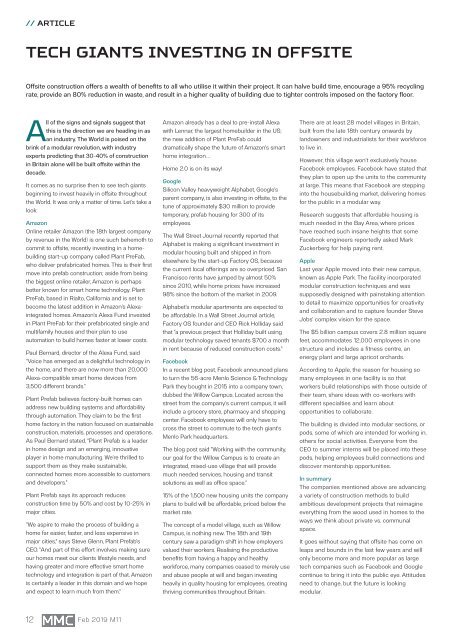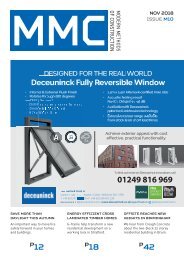a.aa MMC M11 52pp Web
You also want an ePaper? Increase the reach of your titles
YUMPU automatically turns print PDFs into web optimized ePapers that Google loves.
article<br />
Tech giants investing in offsite<br />
Offsite construction offers a wealth of benefits to all who utilise it within their project. It can halve build time, encourage a 95% recycling<br />
rate, provide an 80% reduction in waste, and result in a higher quality of building due to tighter controls imposed on the factory floor.<br />
All of the signs and signals suggest that<br />
this is the direction we are heading in as<br />
an industry. The World is poised on the<br />
brink of a modular revolution, with industry<br />
experts predicting that 30-40% of construction<br />
in Britain alone will be built offsite within the<br />
decade.<br />
It comes as no surprise then to see tech giants<br />
beginning to invest heavily in offsite throughout<br />
the World. It was only a matter of time. Let’s take a<br />
look:<br />
Amazon<br />
Online retailer Amazon (the 18th largest company<br />
by revenue in the World) is one such behemoth to<br />
commit to offsite, recently investing in a homebuilding<br />
start-up company called Plant PreFab,<br />
who deliver prefabricated homes. This is their first<br />
move into prefab construction; aside from being<br />
the biggest online retailer, Amazon is perhaps<br />
better known for smart home technology. Plant<br />
PreFab, based in Rialto, California and is set to<br />
become the latest addition in Amazon's Alexaintegrated<br />
homes. Amazon's Alexa Fund invested<br />
in Plant PreFab for their prefabricated single and<br />
multifamily houses and their plan to use<br />
automation to build homes faster at lower costs.<br />
Paul Bernard, director of the Alexa Fund, said<br />
"Voice has emerged as a delightful technology in<br />
the home, and there are now more than 20,000<br />
Alexa-compatible smart home devices from<br />
3,500 different brands."<br />
Plant Prefab believes factory-built homes can<br />
address new building systems and affordability<br />
through automation. They claim to be the first<br />
home factory in the nation focused on sustainable<br />
construction, materials, processes and operations.<br />
As Paul Bernard stated, "Plant Prefab is a leader<br />
in home design and an emerging, innovative<br />
player in home manufacturing. We’re thrilled to<br />
support them as they make sustainable,<br />
connected homes more accessible to customers<br />
and developers."<br />
Plant Prefab says its approach reduces<br />
construction time by 50% and cost by 10-25% in<br />
major cities.<br />
"We aspire to make the process of building a<br />
home far easier, faster, and less expensive in<br />
major cities," says Steve Glenn, Plant Prefab's<br />
CEO. "And part of this effort involves making sure<br />
our homes meet our clients lifestyle needs, and<br />
having greater and more effective smart home<br />
technology and integration is part of that. Amazon<br />
is certainly a leader in this domain and we hope<br />
and expect to learn much from them."<br />
Amazon already has a deal to pre-install Alexa<br />
with Lennar, the largest homebuilder in the US;<br />
the new addition of Plant PreFab could<br />
dramatically shape the future of Amazon's smart<br />
home integration…<br />
Home 2.0 is on its way!<br />
Google<br />
Silicon Valley heavyweight Alphabet, Google's<br />
parent company, is also investing in offsite, to the<br />
tune of approximately $30 million to provide<br />
temporary, prefab housing for 300 of its<br />
employees.<br />
The Wall Street Journal recently reported that<br />
Alphabet is making a significant investment in<br />
modular housing built and shipped in from<br />
elsewhere by the start-up Factory OS, because<br />
the current local offerings are so overpriced. San<br />
Francisco rents have jumped by almost 50%<br />
since 2010, while home prices have increased<br />
98% since the bottom of the market in 2009.<br />
Alphabet's modular apartments are expected to<br />
be affordable. In a Wall Street Journal article,<br />
Factory OS founder and CEO Rick Holliday said<br />
that "a previous project that Holliday built using<br />
modular technology saved tenants $700 a month<br />
in rent because of reduced construction costs."<br />
Facebook<br />
In a recent blog post, Facebook announced plans<br />
to turn the 56-acre Menlo Science & Technology<br />
Park they bought in 2015 into a company town,<br />
dubbed the Willow Campus. Located across the<br />
street from the company's current campus, it will<br />
include a grocery store, pharmacy and shopping<br />
center. Facebook employees will only have to<br />
cross the street to commute to the tech giant's<br />
Menlo Park headquarters.<br />
The blog post said "Working with the community,<br />
our goal for the Willow Campus is to create an<br />
integrated, mixed-use village that will provide<br />
much needed services, housing and transit<br />
solutions as well as office space."<br />
15% of the 1,500 new housing units the company<br />
plans to build will be affordable, priced below the<br />
market rate.<br />
The concept of a model village, such as Willow<br />
Campus, is nothing new. The 18th and 19th<br />
century saw a paradigm shift in how employers<br />
valued their workers. Realising the productive<br />
benefits from having a happy and healthy<br />
workforce, many companies ceased to merely use<br />
and abuse people at will and began investing<br />
heavily in quality housing for employees, creating<br />
thriving communities throughout Britain.<br />
There are at least 28 model villages in Britain,<br />
built from the late 18th century onwards by<br />
landowners and industrialists for their workforce<br />
to live in.<br />
However, this village won't exclusively house<br />
Facebook employees. Facebook have stated that<br />
they plan to open up the units to the community<br />
at large. This means that Facebook are stepping<br />
into the housebuilding market, delivering homes<br />
for the public in a modular way.<br />
Research suggests that affordable housing is<br />
much needed in the Bay Area, where prices<br />
have reached such insane heights that some<br />
Facebook engineers reportedly asked Mark<br />
Zuckerberg for help paying rent.<br />
Apple<br />
Last year Apple moved into their new campus,<br />
known as Apple Park. The facility incorporated<br />
modular construction techniques and was<br />
supposedly designed with painstaking attention<br />
to detail to maximize opportunities for creativity<br />
and collaboration and to capture founder Steve<br />
Jobs' complex vision for the space.<br />
The $5 billion campus covers 2.8 million square<br />
feet, accommodates 12,000 employees in one<br />
structure and includes a fitness centre, an<br />
energy plant and large apricot orchards.<br />
According to Apple, the reason for housing so<br />
many employees in one facility is so that<br />
workers build relationships with those outside of<br />
their team, share ideas with co-workers with<br />
different specialties and learn about<br />
opportunities to collaborate.<br />
The building is divided into modular sections, or<br />
pods, some of which are intended for working in,<br />
others for social activities. Everyone from the<br />
CEO to summer interns will be placed into these<br />
pods, helping employees build connections and<br />
discover mentorship opportunities.<br />
In summary<br />
The companies mentioned above are advancing<br />
a variety of construction methods to build<br />
ambitious development projects that reimagine<br />
everything from the wood used in homes to the<br />
ways we think about private vs. communal<br />
space.<br />
It goes without saying that offsite has come on<br />
leaps and bounds in the last few years and will<br />
only become more and more popular as large<br />
tech companies such as Facebook and Google<br />
continue to bring it into the public eye. Attitudes<br />
need to change, but the future is looking<br />
modular.<br />
12<br />
Feb 2019 <strong>M11</strong>
















